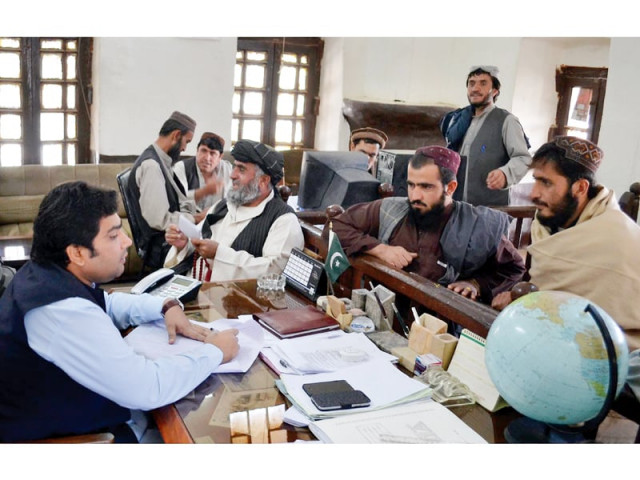Local govt elections: Amid chaos, ECP finalises poll supervisors
Returning officers will start receiving nomination forms in Sindh and Punjab from Monday.

Aspiring candidates submit their nomination papers to a returning officer in Chaman. PHOTO: INP
Amid sheer chaos and uncertainty over the upcoming local bodies’ elections, the Election Commission of Pakistan (ECP) issued the list of returning officers (ROs) for Punjab and Sindh on Saturday.
According to the schedule, the ROs should start receiving nomination forms from candidates from Monday.
For Punjab, district coordination officers will act as district returning officers (DROs), while officials working with the district and tehsil administrations will act as ROs and their assistants. A similar pattern has been adopted for Sindh.
These officials will be practically in charge of the entire electoral exercise: from receiving nomination forms, scrutinising them and hearing objections to the final vote count and compilation of results.
Since the country’s civil service structure is believed to be highly politicised, the move to appoint non-judicial officials as electoral staff is bound to raise questions about transparency of the exercise.
“Since the Supreme Court’s order is binding, we are continuing our work,” an ECP official told The Express Tribune.
Under the law, it is the responsibility of the provinces to nominate ROs, he added. “They [the provinces] sent us a list and we’ve put the list on our website to let the public know.”
In the Judicial Policy 2009, the Supreme Court had decided that judicial officers will not perform election duties and relevant authorities should make alternate arrangements. However, no step was taken in this direction despite the lapse of four years and a new mess is likely to pop up now. The judiciary waived the policy for the May 2013 elections, but refused to do so this time around.
On the Supreme Court directives, the ECP issued the LG election schedule for Sindh and Punjab earlier this week. Schedule for Balochistan was issued earlier. Balloting is scheduled to take place on November 27 in Sindh and on December 7 in Punjab and Balochistan according to the schedule.
The court fixed these dates on the basis of the written affidavits filed by these provinces. Now, none of them seem well poised to conduct the polls.
Election authorities had apprised the Supreme Court that they couldn’t complete preparations by the given deadlines. The most important among them is the printing of millions of ballots on specified paper and providing magnetic ink for voters’ thumb impressions. The identity of voters can be verified if the thumb impressions are marked with the specified ink.
The court rejected the plea and asked the ECP to hold the polls on the given dates. To absolve itself of responsibility, it asked the federal and provincial governments to share the burden. To avoid a possible contempt of court, the election authorities are continuing their work despite the odds.
The ECP on Saturday put the nomination forms along with the names of DROs, ROs and assistant returning officers on its website.
At least 800,000 printed copies of nomination forms are needed for Sindh and around 5 million for Punjab. As per the schedule, aspiring candidates will have to file their nominations on November 12 and 13.
ECP officials say they don’t want to be singled out by the court. “The ECP is continuing its work. We’ve asked the government to ensure timely printing of ballot papers,” an official said.
“Another government department is responsible for procuring magnetic ink. It’s the responsibility of all state institutions to assist the commission,” the official added.
The federal government after consulting the provinces has excused itself from printing the ballot papers needed for the electoral exercise.
The National Assembly recently passed a unanimous resolution calling for delaying the LG elections. The lawmakers said printing of ballot papers from private presses will compromise the secrecy of polls and make the whole process prone to rigging.
The Sindh government, meanwhile, has filed a petition in the Supreme Court’s Karachi registry seeking an extension in the November 27 deadline.
On the other hand, the Lahore High Court has already scrapped the non-party based Local Government Act of Punjab and called for holding party-based polls in the province. The provincial cabinet indemnified the court order in its meeting on Saturday. The province has yet to change the act.
The Supreme Court is scheduled to resume hearing of the case in Islamabad on Monday while its Karachi registry will take up the Sindh government petition.
Published in The Express Tribune, November 10th, 2013.



















COMMENTS
Comments are moderated and generally will be posted if they are on-topic and not abusive.
For more information, please see our Comments FAQ